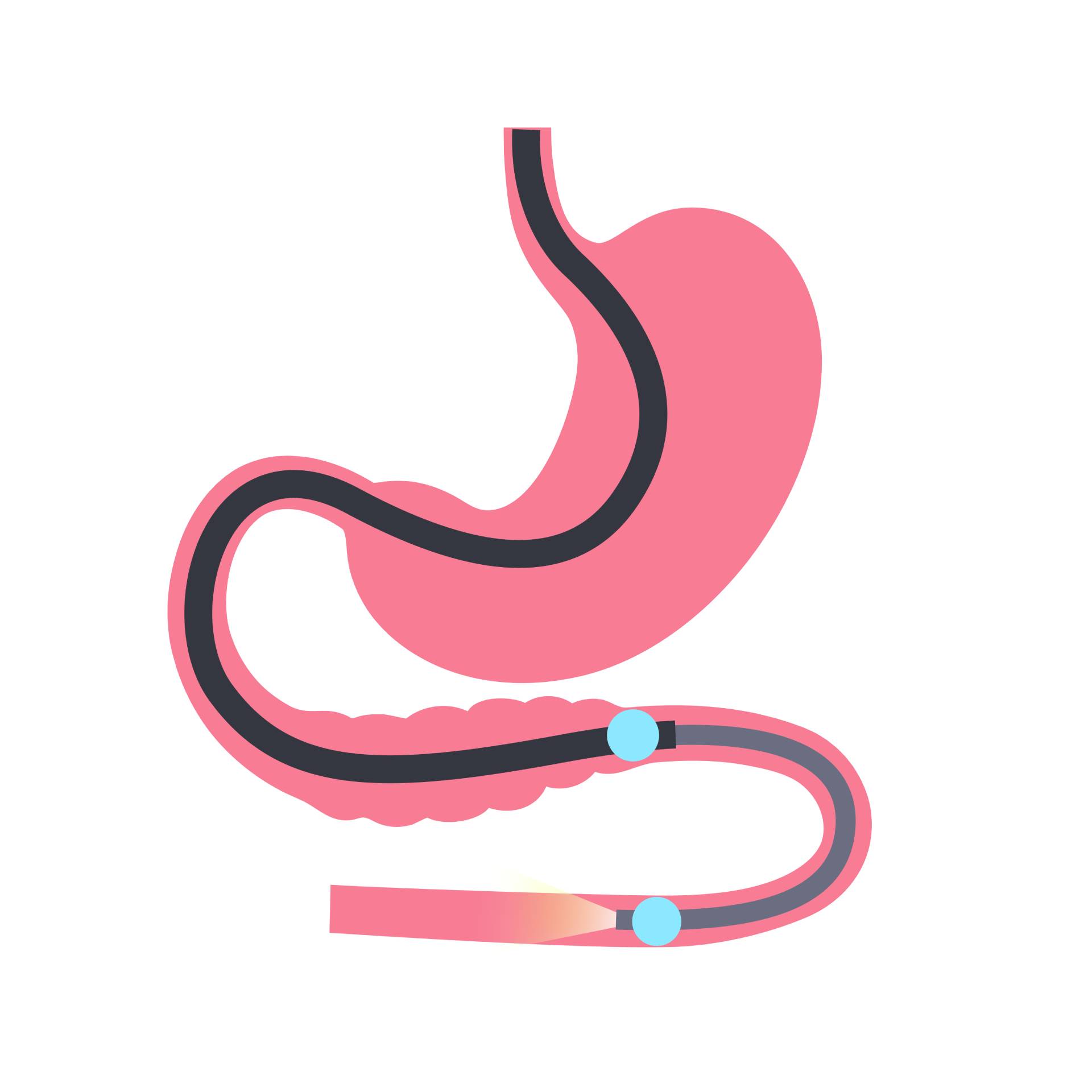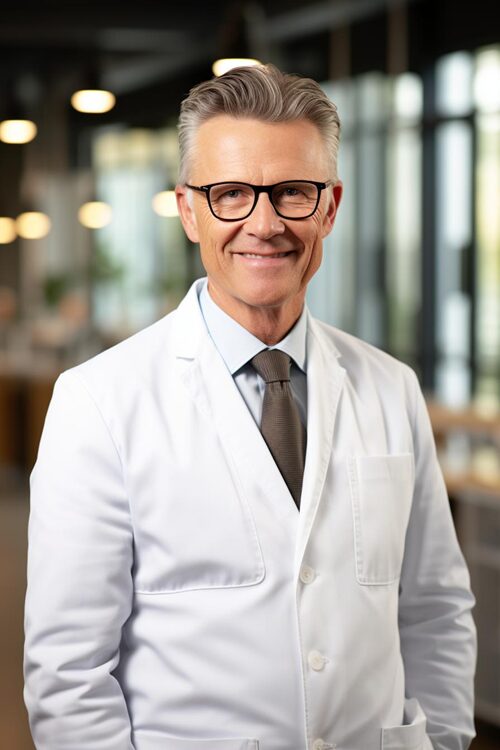Enteroscopy in Florida
What is an enteroscopy?
An enteroscopy is an endoscopic procedure in which a long, thin, bendable tube or “scope” is placed into your mouth and propelled to the second portion of the small intestine, known as the jejunum. The scope has a light and a camera at the end, which allows your provider to see the inner portion of the esophagus, stomach, and small bowel. An enteroscopy may be suggested to diagnose the reason for GI problems such as stomach pain, bleeding, or abnormal x-ray results. If you need an enteroscopy, contact our team of talented GI doctors at Gastroenterology Associates of Florida to learn more. Our providers commonly perform enteroscopies for Florida individuals and look forward to helping you manage your digestive health.

Why does someone need an enteroscopy?
An enteroscopy is typically used to diagnose concerns or conditions in the small intestine. Signs or symptoms of such concerns may involve:
- Unusual x-ray results
- Unexplained bleeding
- Unexplained diarrhea
- Abnormal growths or tumors in the small bowel
To a certain extent, the alternatives to this exam will largely depend on the reason for needing to have the enteroscopy procedure in the first place. In a variety of cases, an enteroscopy is the best method to diagnose and treat concerns in the upper GI tract, particularly if they concern the second portion of the small intestine or jejunum. However, the x-ray known as an upper GI/small bowel follow-through can appraise the upper GI tract, too. This, however, is just a diagnostic tool. Treatment of any abnormalities will require an enteroscopy or a surgical procedure.
What should I expect before my enteroscopy?
Prior to your enteroscopy, you will be given orders from your Gastroenterology Associates of Florida GI provider informing you of the required preparation. Most patients will be allowed to eat as normal the day prior to their procedure. You will be required not to eat or drink anything after midnight. It is very important to follow the directive given to you by your doctor. There will also be additional instructions regarding your medications. In the majority of instances, your medications will be continued as instructed. However, in some individuals, especially patients who take anti-coagulants and who have diabetes, special rules will be given.
What happens on the day of my enteroscopy?
You will be asked to arrive at the endoscopy unit 1 to 1.5 hours before your enteroscopy exam. This gives you time to fill out patient forms and prepare for the procedure. You will be asked to switch into a medical gown. An intravenous (IV) catheter will be inserted in your arm so sedation can be given to you. We will connect you to equipment that will allow the providers to monitor your heart rate, pulse, oxygen levels, and much more while you’re in our care.
Once settled in your exam room, you will be asked to lie on your left side on our procedure bed. The sedation will then begin. We will give you small amounts at a time to make sure you do not have any adverse reaction to the sedation and to give you only the amount you specifically need. Once the right amount of medication is reached, the endoscope will be carefully placed into the mouth. The scope will be carefully advanced through the esophagus, stomach, and small intestine. A bit of air is injected through the scope into the GI tract to help your physician see. Any remaining fluid in your upper gastrointestinal tract is removed through the scope. Based on the outcome of your procedure, several things can be suggested at the time of your enteroscopy, including biopsies, removal of polyps, and control of bleeding. Once we’re done, air and remaining fluid are drawn out through the scope. Based on what we find, the procedure often takes somewhere between 15 – 45 minutes.
Once the exam is done, you will be taken to a separate recovery room to be observed while the sedation wears off. The amount of IV sedation used during the exam and your particular reaction to the medication will dictate how fast you wake up. Many patients are alert enough for discharge after about 45 – 60 minutes. You cannot drive for the remainder of the day; therefore, you will need to arrange for a ride home. You will not be able to work, sign important papers, or perform taxing activities for the remainder of the day. Many of our patients are capable of eating and drinking normally after their discharge from the endoscopy unit, however, specific instructions about activities, medications, and eating will be provided before you are discharged.
After your enteroscopy exam, your Gastroenterology Associates of Florida team will discuss the results of the exam with you. A number of people have difficulty remembering the results of the exam because of the effects of the medication. We recommend, if possible, to have someone come with you who can lend a second pair of ears. You will also go home with a report. You will be provided with any biopsy results after about one week.
What are the risks of an enteroscopy?
Generally, an enteroscopy is a safe procedure. Typically, complications occur in fewer than 1% of patients. The majority of complications are not life-threatening, however, if a complication does arise, it may warrant hospitalization and a surgical procedure. Prior to the exam, we will review a consent form with you. Should any questions or concerns arise, these can be discussed with your GI provider before your procedure.
Reactions due to the sedation used could occur. These could include but are not limited to difficulty breathing, effects on your heart and blood pressure, allergic reactions, and irritation of the vein that received the medication. Bleeding may occur with biopsies, removal of polyps, and with dilating strictures. Significant bleeding, which would result in a blood transfusion or hospitalization, is very uncommon. Perforation or laceration of the esophagus, stomach, or small intestine can occur. This may be recognized during the exam, or it might not become obvious for several hours. In many cases, this will result in surgery and hospitalization. This is an uncommon complication, even when biopsies are taken or dilation is performed. It is imperative that you call our office promptly should symptoms like bleeding, abdominal pain or fever occur after the procedure.
Similar to any other test, an enteroscopy is not perfect. There exists a small, accepted risk that abnormal concerns, including cancers, could be undetected during the exam. It is critical to follow up with your provider as advised and keep them informed of any new or ongoing issues.

Diagnostic tools for better GI health
Enteroscopy FAQs
What should I avoid doing after my enteroscopy?
Following an enteroscopy, it’s important not to eat or drink anything until your physician gives you the go-ahead. Adhere to the medication instructions provided to you, and steer clear of any strenuous physical activities. If you encounter severe abdominal pain, persistent bleeding, or develop a fever, reach out to our office immediately.
Who should avoid undergoing an enteroscopy?
Enteroscopy may not be suitable for individuals with certain health conditions that heighten the risk of complications. Those with severe heart or lung diseases, uncontrolled bleeding disorders, or a recent heart attack might face higher risks from sedation and the procedure itself. Additionally, people with anatomical abnormalities or strictures in their digestive tract might be advised against an enteroscopy. It’s crucial to discuss your medical history and any concerns with your healthcare provider to see if enteroscopy is a safe option for you.
How does an endoscopy differ from an enteroscopy?
Endoscopy and enteroscopy both use a flexible tube with a camera, but they examine different parts of the digestive tract. An endoscopy generally looks at the upper gastrointestinal tract, including the esophagus, stomach, and duodenum. In contrast, an enteroscopy is designed to visualize the small intestine, which is further along the digestive tract and harder to access. Enteroscopy is often employed when other tests like endoscopy or colonoscopy haven’t yielded clear results or when there’s a suspected issue in the small intestine.
